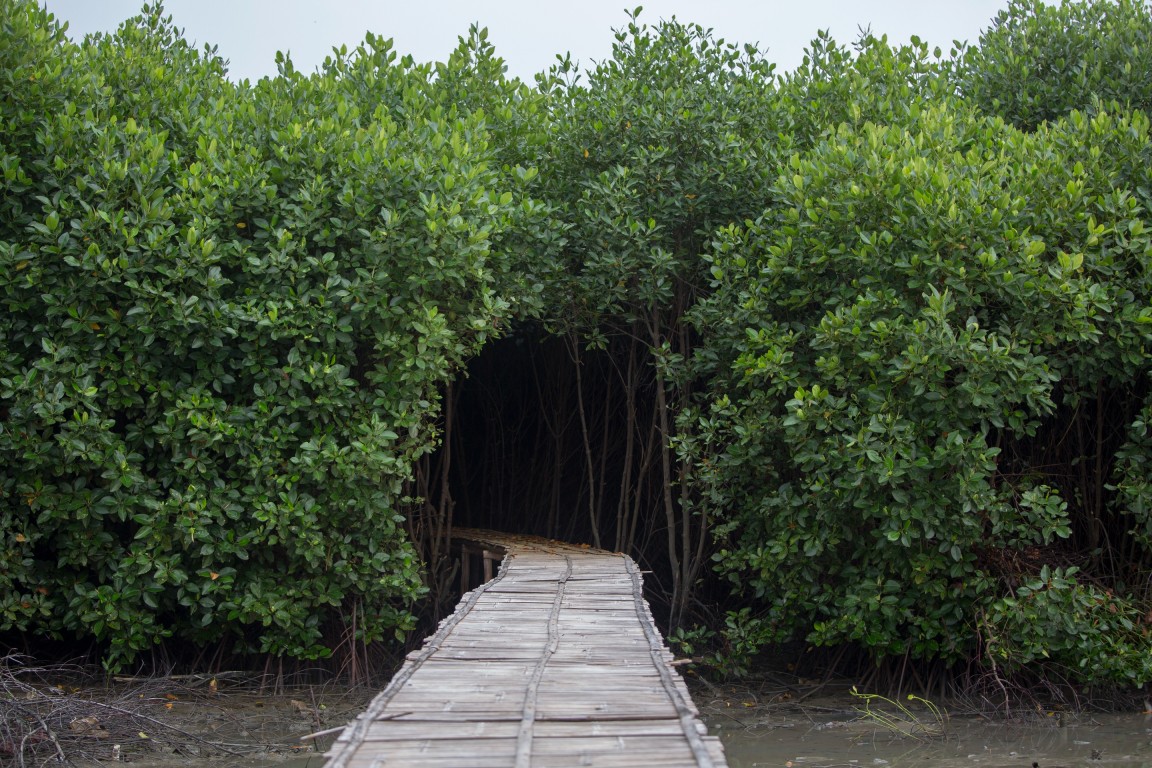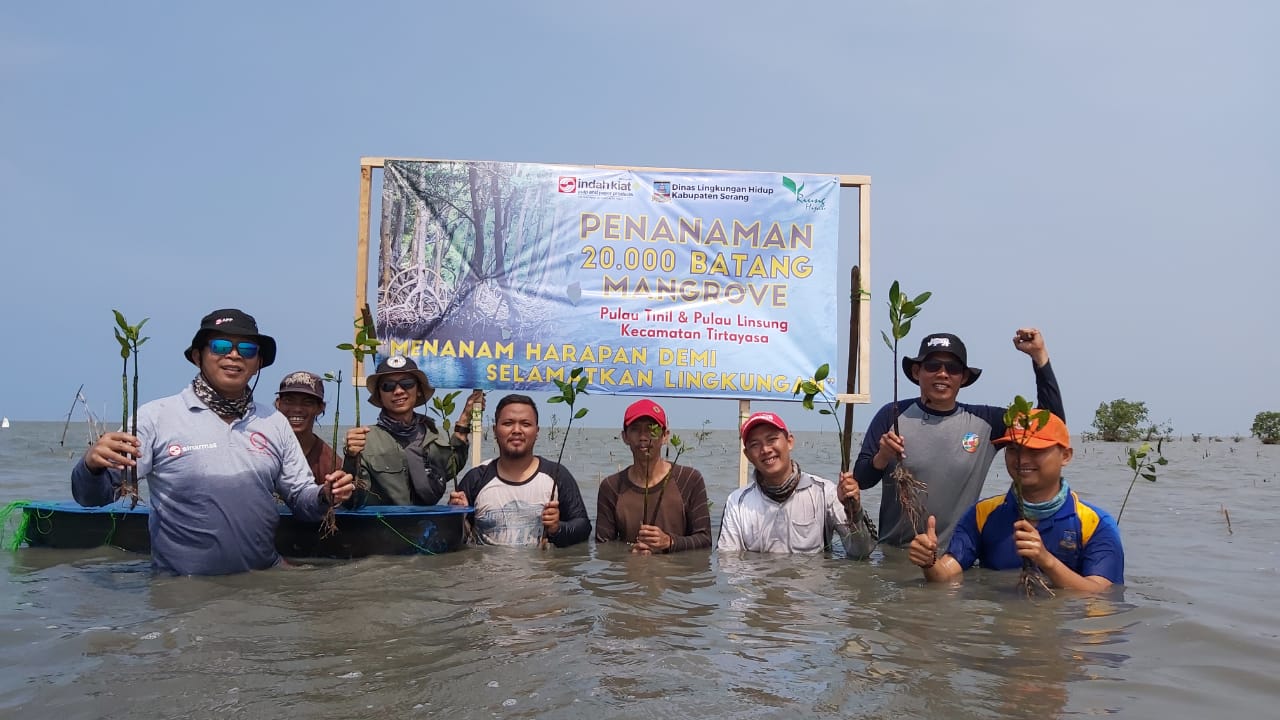
Jakarta, November 27 2020 - Indonesian Tree Planting Day, which is celebrated every November 28, could serve as momentum for various parties to review their efforts in conserving and saving forest ecosystems, including mangroves. This is important given that the existence of mangrove forests is one of the keys to ensuring the ecological balance of the aquatic environment and the sustainability of local economies.
Apart from playing an important role in sustaining the life of marine aquatic organisms that can be utilized by traditional fishermen, mangrove forests also have the potential to support climate change mitigation strategies at the national and global levels. Each hectare of mangrove forest contains 3-5 times more carbon stock than that of lowland forest. The total carbon stock stored in Indonesia's mangrove forests is estimated at 3.14 billion tonnes.
Unfortunately, data from the Ministry of Environment and Forestry (KLHK) shows that 1.8 million hectares out of the total 3.5 million hectares of mangrove forests in Indonesia have been damaged due to area function conversion. The repair to this damage, which has afflicted more than half the ecosystem area, requires serious cooperation from many parties. In response to this, KLHK together with Yayasan Konservasi Alam Nusantara (YKAN) and the private sector are committed to rehabilitating and conserving mangrove forests in various coastal locations.
According to the Ministry of Environment and Forestry, Indonesia has issued various policies to restore mangrove ecosystems, including through the establishment of an Essential Ecosystem Area (KEE), as well as the rehabilitation and conservation of mangrove forests. "These policies have strategic value as part of efforts to achieve the Nationally Determined Contribution (NDC). The prevention of mangrove forest degradation and deforestation can also contribute to reducing emissions by between 107,3 and 455,2 tonnes of CO2/ha," said Senior Researcher at the Center for Research on Socio-Economic Development, Policy and Climate Change (P3SEKPI) KLHK Dr. Yanto Rochmayanto.
However, saving mangrove ecosystems has its own challenges, including rampant encroachment and conversion of mangrove forests into fish or shrimp ponds. According to the Executive Director of Yayasan Konservasi Alam Nusantara Herlina Hartanto, "Efforts to rehabilitate and conserve mangrove ecosystems in Indonesia face several challenges. These challenges need to be addressed with accurate scientific data used to design a good conservation and restoration plan, policies that support integrated mangrove ecosystem management, adequate funding, and stronger cooperation among parties."
Responding to this challenge, APP Sinar Mas is one of four companies partnering with YKAN to fully support its efforts to save mangrove forests. APP Sinar Mas has committed to donate a total of USD 300,000, or around 4.3 billion Rupiah, for a five-year collaboration with the Mangrove Ecosystem Restoration Alliance (MERA). This program, which was initiated by YKAN, includes the restoration of 500 hectares of mangrove forests in Muara Angke, Muara Gembong, and Muara Cisadane. Furthermore, APP Sinar Mas, through the MERA program and in collaboration with YKAN, will also expand conservation efforts in mangrove forest areas in OKI District, South Sumatra, through the east coast management program in 2021.

APP Sinar Mas has quite a long track record in conserving mangrove forests. Since 2010, Indah Kiat Pulp & Paper (IKPP) Serang, a business unit of APP Sinar Mas, has collaborated with the Regency Government and been assisted by a local NGO in planting 110,000 mangrove trees covering an area of 11 hectares in Tirtayasa, Pontang, and Tanara, in Serang Regency. In 2018-2020, IKPP Tangerang in Mauk also planted 65,000 mangrove seeds in the Tanjung Pasir Teluknaga Mangrove Center area and collaborated with local mangrove farmer groups and the Tangerang Regency Government in nursing the mangrove seedlings.
Efforts to save mangrove ecosystems require support from many parties, including the private sector. “Mangrove forest conservation requires the collective efforts of various parties. We would like to express our deepest appreciation to the four MERA partner companies, namely APP Sinar Mas, PT Indofood Sukses Makmur, Tbk, PT Chevron Pacific Indonesia, and PT Djarum, for supporting mangrove ecosystem conservation and restoration. We also hope these ongoing partnerships can inspire, embrace, and unite more companies along with other parties in Indonesia,” Herlina explained.
Mangrove management in Indonesia is carried out collaboratively by the Central Government, Local Governments, NGOs and the private sector, especially in terms of providing science and technology as well as innovations aimed at mangrove conservation and the welfare of coastal communities. Dr. Yanto added, "The government appreciates the parties who have worked in a complementary manner to protect and conserve mangrove ecosystems. This is a pattern that should be continued and further expanded."
According to APP Sinar Mas Chief Sustainability Officer Elim Sritaba, the success of the mangrove forest conservation program collaboration is part of APP Sinar Mas' fulfilment of its sustainability vision. "As a company engaged in forestry, we understand the importance of protecting and preserving nature to ensure the sustainability of its resources. We hope that APP Sinar Mas' cooperation with related institutions will become even stronger in the future, thereby making an even greater contribution to climate change mitigation by maintaining carbon stocks in mangrove ecosystems," said Elim in conclusion.


